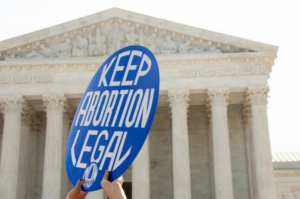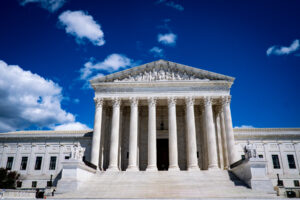Legislature, not governor, has authority over federal COVID-19 funds
5 min read
The New Mexico Supreme Court, in a ruling from the bench, ordered Gov. Michelle Lujan Grisham to stop using any unspent federal COVID-19 stimulus money without approval from the state Legislature.
New Mexico Supreme Court Justice Michael Vigil, after a brief deliberation by the justices, read the ruling.
“The court grants standing to the petitioners on the basis of great public importance,” Vigil said. “One, the court determines that a writ is appropriate in this case, and the court will order that a writ of prohibition and mandamus, prohibiting the governor and the state treasurer and all other state officials subject to their authority from transferring, encumbering, committing or appropriating any additional funds out of the state [American Rescue Plan Act] account in the state treasury absent legislative appropriation.”
The court’s decision was the culmination of weeks of court filings in a case filed by two state senators. Democratic State Sen. Jacob Candelaria of Albuquerque and Republican Sen. Greg Baca of Belen jointly filed a petition with the state’s high court, arguing that the governor overstepped her constitutional authority by appropriating federal funds without legislative oversight.
Candelaria told NM Political Report that the state supreme court “Ultimately did the right thing,” by placing the responsibility with the Legislature instead of one person.
“As a citizen of this state, it gives me great comfort to know that decisions about this money are going to be made through a transparent open and public appropriations process and not behind closed doors where the governor gets to consult with her political favorites on how to dole out these funds in her political interests,” Candelaria said. “That would have been a really dangerous precedent for New Mexico.”
Four other Democratic state senators joined the case as intervenors, echoing the argument that federal funds, such as the COVID-19 stimulus money, should be controlled by the Legislature. Sen. Daniel Ivey-Soto, D-Albuquerque, argued on behalf of the four additional senators in court on Wednesday and made a point to say the petition had little to do with Lujan Grisham or ARPA funds specifically.
“This case is not just about these monies because there are other funds that may be coming. This case is not about this governor,” Ivey-Soto told the justices. “This case is about the construct of our constitution.”
Candelaria, the most vocal Democratic critic of Lujan Grisham, told NM Political Report he agreed with Ivey-Soto’s sentiment, but Candelaria also criticized the leadership of his own party for not backing him in filing the petition.
“I think that’s exactly the perspective that the leadership in the Senate completely lost,” Candelaria said. “I don’t think I should have had to drop this case on my own, with Senator Baca, as an individual legislator.”
State Treasurer Tim Eichenberg, as a party of interest, was also represented by a lawyer in court on Wednesday. Eichenberg’s attorney, Ivey-Soto and Candelaria all argued that federal funds that come to the state without specific earmarks should be controlled by the Legislature, not the governor.
Holly Agajanian, Lujan Grisham’s chief legal counsel, argued, in part, that since Lujan Grisham herself advocated for the federal stimulus money that her office should be in control of how it is spent. At one point in the proceedings, Agajanian tried to flip an argument by the petitioners and intervenors that the governor would only have a say in spending if the federal funds were designated to a specific state department. In a case from the 1970s, for example, the state supreme court ruled that funding designated for higher education could be appropriated by the governor.
Therefore, Agajanian argued, there should not be a significant difference between money for a department overseen by the governor and money sought by the governor herself.
“How did the state get this money? The executive applied for it,” Agajanian told the justices.
While the justices asked critical questions of all of the attorneys involved, one of the more critical lines of questioning towards the governor’s office came from Justice David Thomson, who was appointed to the high court by Lujan Grisham.
“It’s a billion dollars in public funds and that’s what the Legislature does,” Thomson said. “I mean, I learned that in the second grade. They control the purse strings.”
“Judge, it depends on what’s in the purse,” Agajanian countered.
In closing, Agajanian said that even though the court did not order Lujan Grisham to stop spending the federal money while the case was pending, the governor opted to do so on her own accord.
“I want to note, the governor hasn’t spent any of the funds during the pendency of this case, because it’s not her goal to subvert the judicial process,” Agajanian said.
Lujan Grisham spent $700 million of the $1.8 billion the state received, leaving about $1.1 million for the Legislature to appropriate.
During a press conference to announce new staff to her administration, Lujan Grisham said she was disappointed with the court’s decision, but that the decision is now in the hands of lawmakers.
“I was disappointed in the supreme court decision, but it’s not going to rain on my parade and I don’t think it’s going to rain on the Legislature’s parade,” Lujan Grisham said.
Lujan Grisham is expected to call the Legislature back to Santa Fe for a special session to address redistricting next month, but she could also add appropriation of APRA to the list of priorities.
Outside of the proceedings, Baca was not allowed into the chambers for allegedly refusing to disclose his COVID-19 vaccination status.
At the beginning of the proceedings, Chief Justice Vigil announced that the only people allowed in the courtroom were attorneys who showed proof of vaccination.
“The supreme court takes COVID prevention measures very, very seriously,” Vigil said. “For that reason, all members of the court have been fully vaccinated and we’re wearing our masks. In that regard, the only people that are allowed in the courtroom are pro se parties and attorneys for the parties, all of whom have provided the court with proof that they’re fully vaccinated and wearing masks.”
In a statement, Republican Party of New Mexico Chairman Steve Pearce called it a “devastating day for the reputation of the New Mexico Supreme Court.”
“Sadly, it comes as no surprise that a court comprised of Democrats and governor-appointed justices would ban the lone Republican plaintiff in a case against the governor,” Pearce said.
Candelaria told NM Political Report that he would not weigh-in on the merits of the court’s rules, but said that it “certainly has the absolute authority to make its own rules regarding its court.”
“That is certainly an issue that Senator Baca has to discuss with the Supreme Court,” Candelaria said. I don’t have any comments on it at this time, other than to say that I do publicly thank Senator Baca for joining with me in a bipartisan way to stand for principle and to go out on a ledge, politically.”
This article was originally posted on Legislature, not governor, has authority over federal COVID-19 funds







